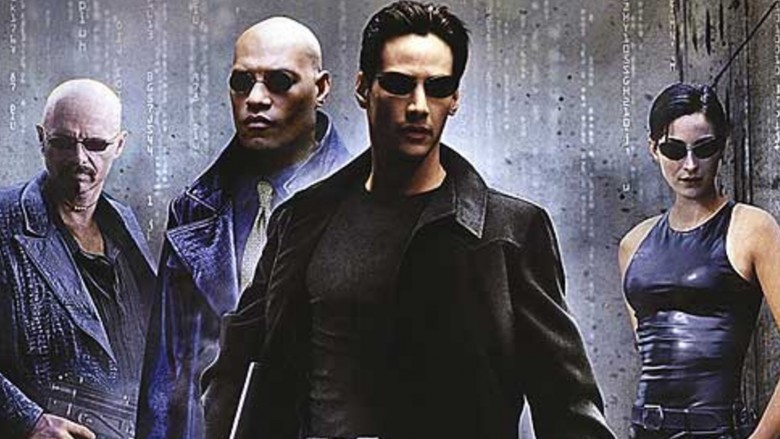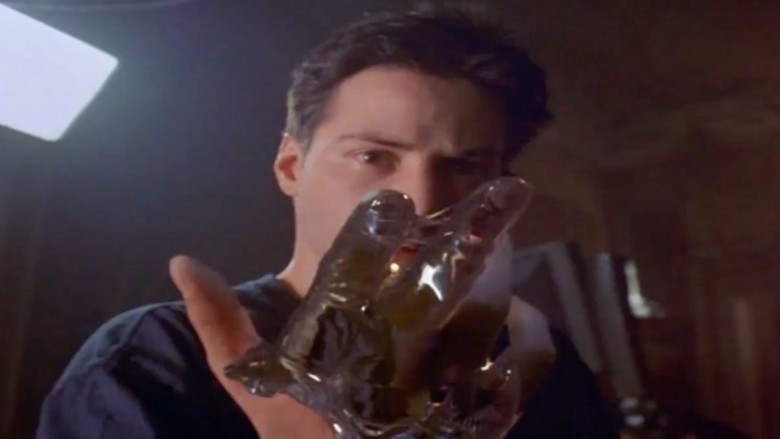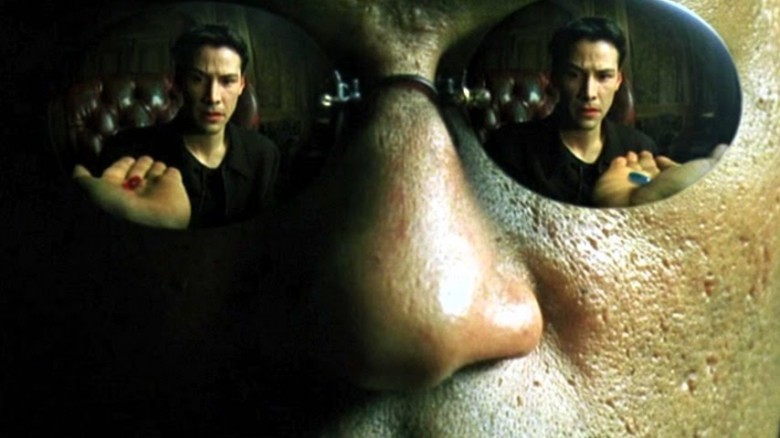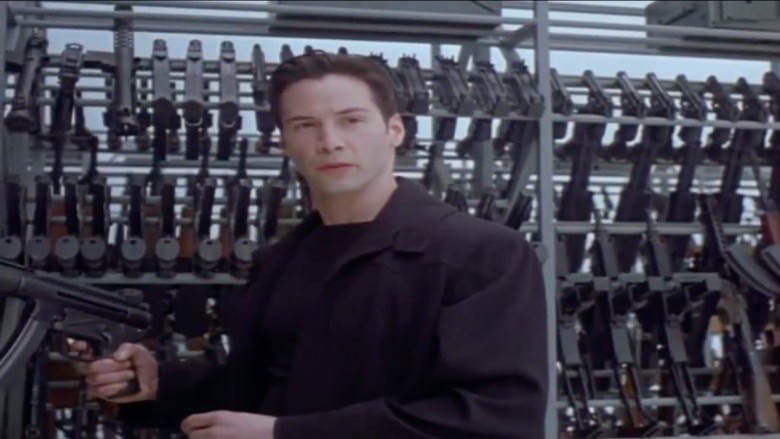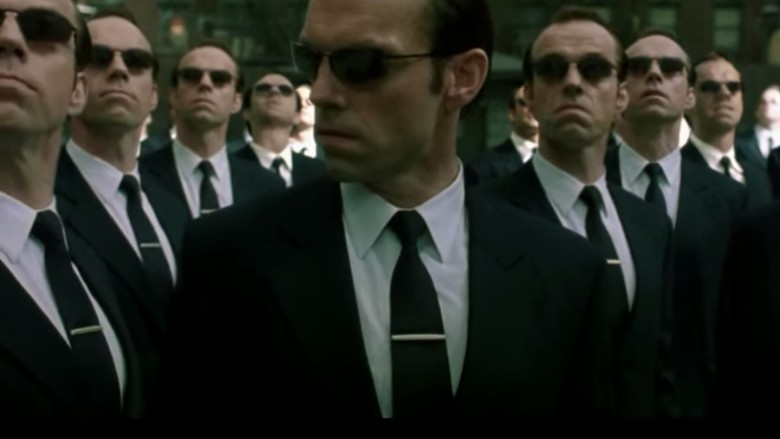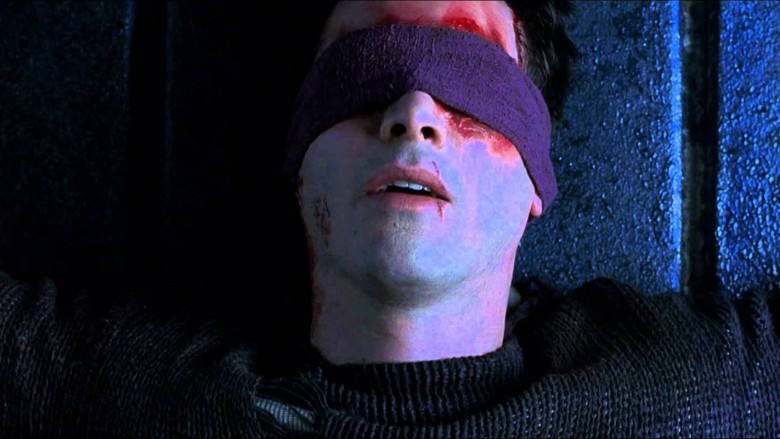Why We'll Never Get To See A Matrix 4
In 1999, The Matrix hit theaters, showing the entire world just how deep the rabbit hole goes. The trilogy of films was groundbreaking, awe-inspiring, and a massive cash cow; all told, it grossed more than a billion dollars worldwide (and that's not even including the spike in sales of replica black trenchcoats and vinyl pants), and it left a permanent mark on the cultural landscape, inspiring countless memes, homages, and even its own religion. But for all that, there's one thing The Matrix will probably never accomplish: a comeback. Here's why we're not likely to ever see The Matrix reborn onscreen.
There was never supposed to be a fourth Matrix movie
From the very first, the Wachowskis—who wrote and directed The Matrix—envisioned their project as a trilogy, with the fate of the second and third installments hinging on the success of the first. Needless to say, the then-record-breaking performance of The Matrix made it a no-brainer for Warner Bros. to go ahead with The Matrix Reloaded and The Matrix Revolutions, which they filmed simultaneously for release in 2003.
But unlike other franchises, e.g. the superhero films for which their comic-book source material supplies a never-ending slate of new storylines, The Matrix was not written with an infinite succession of movies in mind. As recently as 2016, producer Joel Silver negged the possibility of a fourth Matrix, saying, "That was very seriously designed as three stories and that was it"—although he did throw a bone to hopeful fans by adding, "but we'll see what happens." Still, the door appears to be fully closed on continuing the existing Matrix storyline; at this point, the best hopes of seeing the franchise make a comeback are in the form of either a prequel series a la Star Wars, or a total reboot with an all-new cast.
The cast is getting old
And speaking of the cast: it's coming up on 20 long years since The Matrix debuted in 1999, which means that the franchise's lead actors Keanu Reeves, Carrie-Anne Moss, Laurence Fishburne, and Hugo Weaving are all officially middle-aged if not eligible for AARP membership. As of this writing, Reeves is 52; Fishburne is 55; Weaving is 56; and Moss, the youngest of the crew, is 49 years old—and with the exception of Reeves, who continues to star in action films and has maintained his physique accordingly, they've all moved on to projects that aren't quite as physically demanding as The Matrix series. Even if their characters were resurrected for a new Matrix movie, it would be a tall order for this aging cast to get back into kung-fu-fighting condition (not to mention their unforgiving all-leather wardrobes.)
Morpheus and Neo have already been reunited
As far as getting the Nebuchadnezzar crew back together again, the good news is that Reeves and Fishburne are great pals and really enjoy working together. The bad news, alas, is that they've already made that happen in the second John Wick movie, John Wick: Chapter 2. Fishburne revealed how he lobbied Reeves to bring him on board for the gritty hitman franchise, saying, "Yeah, Keanu and I have remained friends and we saw each other and I told him I watched [the first John Wick movie] and loved it. He was about to start the movie again and I was like, 'Yo, man, you gotta talk to [director Chad Stahelski] and tell him that your boy Fish wants to come get down,' because I really wanted to be a part of it. They found something for me to do, and it was really cool."
With their jones for an onscreen reunion already satisfied (and the possibility still in play that they'll be together again for John Wick: Chapter 3), it's increasingly less likely that we'll ever see Morpheus sparring with Neo in a new installment of The Matrix.
Nobody is impressed by bullet time anymore
In 1999, The Matrix was an historic, game-changing entry into the annals of science fiction cinema—not least because it looked like nothing audiences had ever seen before. Computer-generated special effects were still in their infancy, and the visuals of The Matrix, particularly the super-slow-motion technique known as "bullet time" showcased in the film's most famous shootout scene, were absolutely unprecedented in Hollywood and right on the cutting edge of what technology could achieve at the time.
But in the years since the Wachowskis wowed audiences with these groundbreaking effects, the industry has caught up to the point where high-quality digital wizardry is easy, inexpensive, and so commonplace that we don't even notice it anymore. The original bullet-time shot took 18 months to put together in the late 1990s; now, an effect like that can be cranked out by the average CGI studio in a matter of weeks. And unless the Wachowskis have something new and exciting up their sleeves that'll make a contemporary audience's eyes pop, a return to The Matrix isn't going to impress people the way the original trilogy did.
The Matrix might be too big to reboot
If there's a downside to having made one of the biggest, most profitable movie franchises in recent memory, it's this: The Matrix has gone totally meta since its debut. The original trilogy is the subject of countless memes; its most famous moments have been referenced by everything from Shrek to the Muppets to The Simpsons; and it was memorably spoofed at the 2003 MTV Movie Awards in an opener featuring Justin Timberlake and Sean William Scott. In other words, it comes with the kind of cultural baggage that can make Hollywood nervous about trying to stage a reboot. Unless you pull off the perfect remake, it's only a matter of time until some doink yells "I know kung fu!" during a dramatic moment and ruins everything.
And of course, there's the small matter of the red pill
If you've spent any time on the internet lately, you're probably aware that Morpheus' trademark monologue about getting a reality check in the form of "taking the red pill" has been co-opted by one of the internet's less-likeable communities—and for purposes the Wachowskis almost certainly didn't intend. So-called Red Pillers throng around a philosophy of "sexual strategy in a culture increasingly lacking a positive identity for men," which in practice has given the group a pretty widespread reputation for misogyny. When one of the most famous phrases from your movie is now largely associated with a reviled group of angry men on the internet, it might not make all the difference between choosing to revisit that story or not—but it probably wouldn't help, either.
The Wachowskis may not want to go back to The Matrix
A lot has changed since 1999, and the part where the Wachowski brothers are now the Wachowski sisters is actually the least of the big differences in their creative lives. They're famously picky about their projects; it took three years after the release of The Matrix Revolutions before they put out another film, in the form of the political (and entirely different from The Matrix) dystopian thriller V for Vendetta. And if you look at their slate of ambitious projects since then—from Cloud Atlas to Jupiter Ascending—it's clear that the pair are in the business of pushing their limits and trying new things, not revisiting the same territory they've already tread.
Add to that the fact that the Wachowskis aren't even making movies these days; as of 2016, Lana's attention was focused on their Netflix series Sense8, while Lilly seemed to be taking some time off work during her gender transition. Based on the arc of their respective careers, the likelihood of them being willing to re-enter The Matrix—or to give someone else permission to take the reins on the franchise that made them famous—dwindles ever further.
And Hollywood may not be willing to risk a reboot
Although The Matrix was a mega-big-deal for its time, grossing a whopping $1.6 billion at the box office over the course of three films, the Wachowskis haven't gone on to become reliable moneymakers for their studios. Lately, their movies have had two unfortunate things in common: they're expensive to make, and they don't earn back their budgets, even when critics are on board. The sprawling sci-fi epic Cloud Atlas was a highly polarizing project—critical reaction was evenly split between hating it and thinking it was pure genius— but it barely eked out a $130 million gross on its $128 million budget. And Jupiter Ascending, their grand space opera, was an even bigger disaster; not only was it expensive to make and unprofitable with audiences, it was panned by critics who called it goofy, inane, and "an incoherent sci-fi spectacle."
It almost seems like the Wachowskis' approach to filmmaking, in which a sprawling and inventive visual world is used to prop up a not-quite-fully-fleshed-out story, doesn't work as well now as it did at the start of the 21st century—and their power to secure a big studio budget, the kind it would take to crank out a new Matrix movie, isn't what it used to be.
The internet may have killed it
In 2016, the internet briefly caught fire thanks to a newly-surfaced series of "quotes" from Keanu Reeves, in which he supposedly confirmed that not one, but two new Matrix films were in the works and were going to start shooting imminently. The rumor turned out to be baloney, of course, but it garnered decidedly mixed reactions from fans—some of whom were enthusiastic (particularly about the idea of a prequel series), but many of whom just wanted to see the original trilogy left alone. If producers were watching those conversations in an attempt to take the temperature of the fanbase vis-à-vis an audience for more Matrix, they wouldn't have been encouraged by what they saw.
That's why a Matrix 4 probably won't happen; but hey, here's why it could
The most obvious argument in favor of a new Matrix movie is the strength of the current Hollywood trend toward 1980s and 1990s nostalgia. Whatever you thought of the original, and whether you agree that there's room for additional stories to be wrung out of the Wachowskis' trilogy, it's undeniably a big-deal film from the teenage years of many a current studio exec (the same ones who greenlit a remake of Point Break, another '90s Reeves classic, in 2015.) But there's also an argument built into the trilogy itself for a potential revival, in the religious sense of the word.
Basically, if you accept that the Matrix was an allegory for the life of Jesus (and there's no shortage of evidence that you should), then you've probably heard of a little thing called the Resurrection. So while Neo, the series' Christ figure, died in the final installment of the Matrix trilogy, that just makes him ripe for revival after three days... or 15 years, as the case may be.
